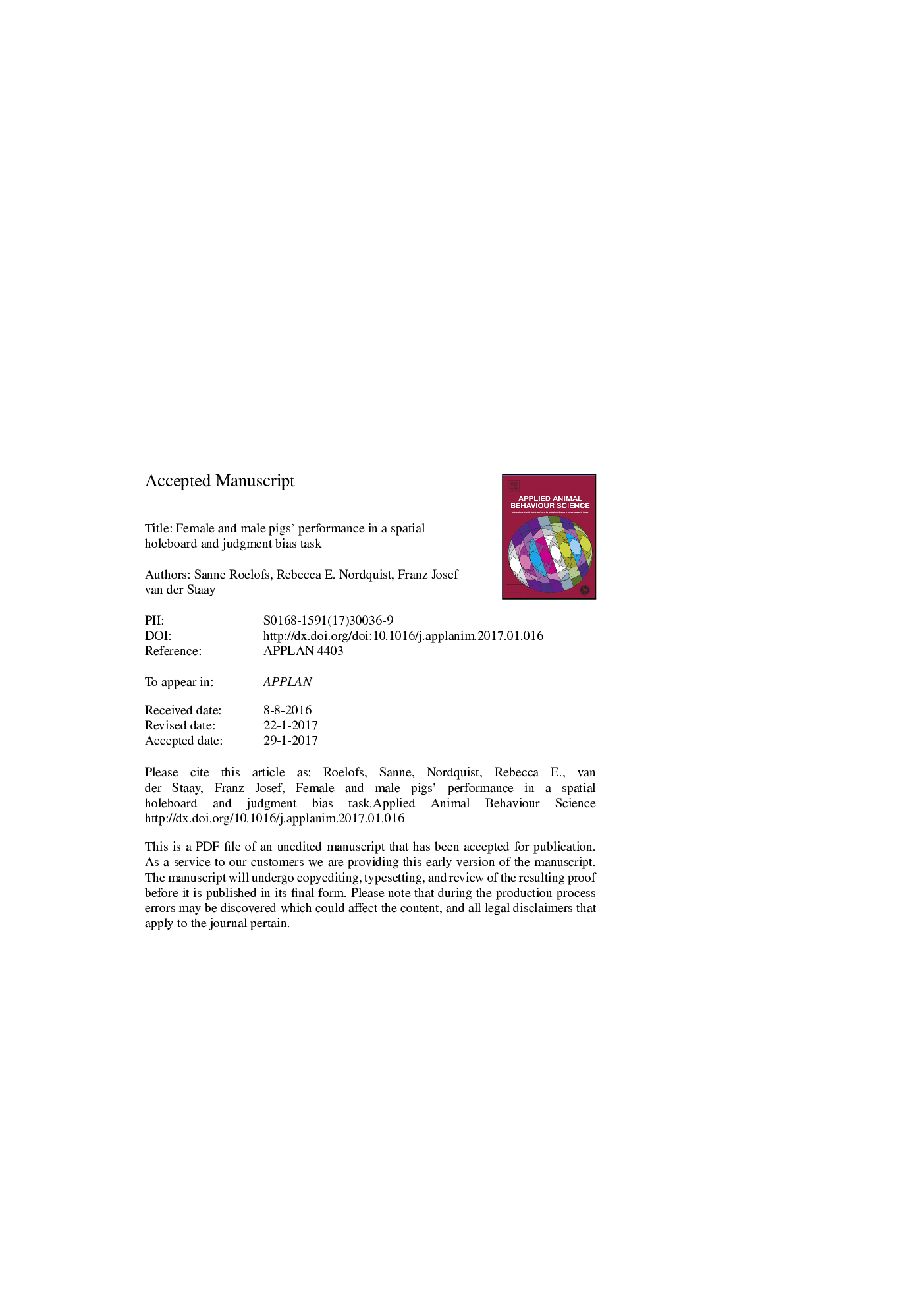| کد مقاله | کد نشریه | سال انتشار | مقاله انگلیسی | نسخه تمام متن |
|---|---|---|---|---|
| 5763416 | 1625315 | 2017 | 35 صفحه PDF | دانلود رایگان |
عنوان انگلیسی مقاله ISI
Female and male pigs' performance in a spatial holeboard and judgment bias task
ترجمه فارسی عنوان
عملکرد خوک زن و مرد در یک مسابقه فضایی و وظیفه متعصب قضاوت
دانلود مقاله + سفارش ترجمه
دانلود مقاله ISI انگلیسی
رایگان برای ایرانیان
کلمات کلیدی
خوک ها، شناخت، تفاوت های جنسی، یادگیری فضایی، حافظه، تعصب قضاوت،
ترجمه چکیده
مطالعات توانایی های شناختی خوک ها به دلیل وابستگی آنها به زمینه های رفاه حیوانات و تحقیقات زیست پزشکی افزایش می یابد. در حالی که هر دو خوک زن و مرد در وظایف شناختی مورد استفاده قرار گرفته است، اختلاف نظر جنسی در عملکرد هنوز توجه زیادی را به خود جلب نکرده است. این موضوع مورد توجه است، زیرا دیمورفیسم جنسی در توانایی های شناختی برای انواع مختلف ثبت شده است. هدف از این مطالعه بررسی تاثیرات جنسی بر عملکرد خوک در دو وظیفه شناختی است. یادگیری و حافظه فضایی ده زن و ده خوک مردانه در یک کارگاه مکانی فضایی مقایسه شد. حافظه کاری و مرجع، و همچنین اندازه گیری انگیزه و اکتشاف، مورد بررسی قرار گرفت. هر دو زن و مرد، این کار را به دست آوردند و هیچ گونه تفاوت بین جنسیت برای هر اندازه گیری از حافظه فضایی یافت نشد. با این حال، خوک های زن در آزمایشات معکوس موفقیت آمیز تر بودند (تأخیر کوتاه مدت برای پاداش اول، تعداد بیشتر پاداش های یافت شده)، نشان دهنده انعطاف پذیری بیشتر پاسخ. این تفاوت بین جنس ها گذرا بود، در حالی که مردان در نهایت به همان اندازه از لحاظ عملکرد زنان به سطح خود رسیدند. تعصب قضایی، اندازه گیری شناختی از حالت عاطفی، بعد از آن با استفاده از یک کار انتخاب عاطفی قضاوت انتخابی ارزیابی شد. خوک ها برای پاسخ گویی به یک محرک منفی و مثبت آموزش داده شده اند، و یا یک پاداش کوچک یا بزرگ را نشان می دهند. در حین آزمایش قضیه، خوک ها با نشانه های مبهم ارائه شده و پاسخ های "مثبت" و "منفی" آموزش دیده آنها به ترتیب به عنوان انتخاب خوش بینانه یا بدبینانه ثبت شده است. هر دو جنس مذکر و مردان به صورت قاطعانه قضاوت می کنند. انتخاب خوش بینانه با آزمایش مکرر برای هر دو گروه کاهش می یابد. احتمال دارد که خوک ها در مورد نتایج بی رقیب نشانه های مبهم آموخته شده، آن ها را مبهم مینماید. بهبود بیشتر وظیفه متعصب قضاوت به عنوان یک معیار شناختی از وضعیت عاطفی مورد نیاز است. به طور کلی، نتایج ما نشان می دهد که جنس در هنگام اندازه گیری عملکرد پایه خوک ها در کارکردهای فضایی یا مقابله با قضاوت ناکارآمد است. اثرات سکس تنها زمانی یافت شد که خوک ها به وظیفه معکوس بازگردانده می شدند، که نتیجه مطالعات بیشتری در مورد تفاوت های جنسیتی در انعطاف پذیری پاسخ داد. چنین تفاوت هایی در مورد رفاه خوک ها وجود دارد، زیرا این امر نشان می دهد که مردان برای مقابله با تغییرات محیط زیست کمتری دارند.
موضوعات مرتبط
علوم زیستی و بیوفناوری
علوم کشاورزی و بیولوژیک
علوم دامی و جانورشناسی
چکیده انگلیسی
Studies of the cognitive abilities of pigs are increasing in number, due to their relevance for the fields of animal welfare and biomedical research. While both female and male pigs have been used in cognitive tasks, possible sex differences in performance have not yet received extensive attention. This is of interest, as sexual dimorphism in cognitive abilities has been documented for a variety of species. The aim of this study was to assess the effects of sex on pigs' performance in two cognitive tasks. Spatial learning and memory of ten female and ten male pigs was compared in a spatial holeboard task. Working and reference memory, as well as measures of motivation and exploration were assessed. Both females and males acquired the task and no differences were found between sexes for any measures of spatial memory. However, female pigs performed more successfully during reversal trials (shorter latency to first reward, higher number of rewards found), indicating greater response flexibility. This difference between sexes was transient, with males eventually reaching the same level of performance as the females. Judgment bias, a cognitive measure of affective state, was subsequently assessed using an active choice judgment bias task. Pigs were trained to respond differently to a negative and a positive stimulus, signaling either a small or a large reward. During judgment bias testing, pigs were presented with ambiguous cues and their trained 'positive' and 'negative' responses were recorded as optimistic or pessimistic choices, respectively. Both females and males displayed a slightly optimistic judgment bias. Optimistic choosing decreased with repeated testing for both groups. It is likely the pigs learned about the unrewarded outcome of ambiguous cues, rendering them no longer ambiguous. Further improvement of the judgment bias task as a cognitive measure of affective state is deemed necessary. Overall, our results indicate that sex is not a confounding factor when measuring baseline performance of pigs in the spatial holeboard or judgment bias task. Sex effects were only found when subjecting the pigs to a reversal task, warranting further study of sex differences in response flexibility. Such a difference would have implications for pig welfare, as it suggests that males are slower to cope with changes in their environment.
ناشر
Database: Elsevier - ScienceDirect (ساینس دایرکت)
Journal: Applied Animal Behaviour Science - Volume 191, June 2017, Pages 5-16
Journal: Applied Animal Behaviour Science - Volume 191, June 2017, Pages 5-16
نویسندگان
Sanne Roelofs, Rebecca E. Nordquist, Franz Josef van der Staay,
